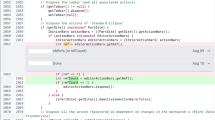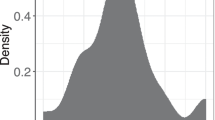Abstract
Business applications automate various business processes within an organization. Business analysts frequently modify business processes to maintain a competitive edge. Estimating the time needed to modify a business process is not a trivial task, since changes to the business process result in changes to the source code of which the business analyst has limited knowledge. We propose a change impact metric which estimates the code to be modified as a result of a business process change. We demonstrate the effectiveness of our proposed change impact metric through a case study, using seven large business applications from the OFBiz open source project.
Similar content being viewed by others
References
Ajila S.: Software maintenance: approach to impact analysis of objects change. Softw. Pract. Experience 25(10), 1155–1181 (1995)
Antoniol, G., Canfora, G., De Lucia, A.: Maintaining traceability during object-oriented software evolution: a case study. In: International Conference on Software Maintenance (ICSM) (1999)
Asmild M., Paradi J.C., Kulkarni A.: Using data envelopment analysis in software development productivity measurement. Softw. Process Improv. Pract. 11, 561–572 (2006)
Antoniol G., Canfora G., Casazza G., Lucia A.D., Merlo E.: Recovering traceability links between code and documentation. IEEE Trans. Softw. Eng. 28(10), 970–983 (2002)
Aversano, L., Bodhuin, T., Tortorella, M. : Assessment and impact analysis for aligning business processes and software systems. In: Proceedings of ACM Symposium on Applied Computing, SAC (2005)
Barros, S., Bodhuin, T., Escudie, A., Queille, J.P., Voidrot, J.F.: Supporting impact analysis: a semi-automated technique and associated tool. In: ICSM (1995)
Bilal, H., Black, S.: Ripple effect: a complexity measure for object oriented software. In: European Conference on Object-Oriented Programming (2007)
Black S.: Computing the ripple effect. J. Softw. Maint. Evol. Res. Pract. 13, 263–279 (2001)
Bohner, S., Gracanin, D., Dong, C., George, B., Ying, J., Zhou, Y.: Software Security Impact Analysis. Goddard Space Flight Center, Advanced Architectures and Automation Branch (2002)
Briand, L.C., Labiche, Y., Soccar, G.: Automating impact analysis and regression test selection. Based on UML designs. In: ICSM (2002)
Briand, L.C., Labiche, Y., O’Sullivan, L.: Impact analysis and change management of UML models. In: ICSM (2003)
Chan, B., Marks, L., Zou, Y.: An approach for estimating code changes in e-commerce appllications. In: International Symposium on Web Systems Evolution (2008)
Chidamber S.R., Kemerer C.F.: A metrics suite for object oriented design. IEEE Trans. Softw. Eng. 20(6), 476–493 (1994)
Daly, J., Brooks, A., Miller, J., Roper, M., Wood, M.: The effect of inheritance on the maintainability of object oriented software: an empirical study. In: ICSM (1995)
de Boer, F.S., Bonsangue, M.M., Groenewegen, L.P.J, Stam, A.W., Stevens, S., Van Der Torre, L.: Change impact analysis of enterprise architectures. In: Information Reuse and Integration Conference (2005)
De Lucia, A., Oliveto, R., Tortora, G.: Recovering traceability links using information retrieval: a controlled experiment. In: International Symposium on Grand Challenges in Traceability, pp. 46–55 (2007)
Fleeger, S.L., Bohner, S.A.: A framework for software maintenance metrics. In: ICSM (1990)
Graves T., Karr A., Marron J., Siy H.: Predicting fault incidence using software change history. IEEE Trans. Softw. Eng. 26(7), 653–661 (2000)
Guo, J., Foo, K., Barbour, L., Zou, Y. : A business process explorer: recovering and visualizing e-commerce business processes. In: International Conference on Software Engineering (2008)
Hassan, A.E., Holt, R.C.: Predicting change in propagation in software systems. In: ICSM (2004)
Henry S., Kafura D.: The Evaluation of Systems’ Structure using Quantitative Metrics. McGraw-Hill International Series, pp. 99–111. McGraw-Hill, New York (1993)
Hoffman, M.A.: Automated impact analysis of object-oriented software systems. In: International Conference on Object-Oriented Programming, Systems, Languages, and Applications, pp. 72–73 (2003)
Huang, M., Zou, Y.: Recovering workflows from multi tiered e-commerce systems. In: International Conference on Program Comprehension, pp. 198–207 (2007)
Kagdi, H., Maletic, J.I.: Combining single version and evolutionary dependencies for software change prediction. In: International Conference on Software Engineering (2007)
Lee M.: Change Impact Analysis of Object Oriented Software. George Mason University, Virginia (1998)
Lipow M.: Number of faults per line of code. IEEE Trans. SE-8(4), 437–439 (1982)
Marcus, A., Maletic, J.I.: Recovering documentation-to-source-code traceability links using latent semantic indexing. In: ICSM (2003)
McCabe T., Butler C.: Design complexity measurement and testing. Commun. ACM 32(12), 1415–1425 (1989)
Mendes E., Mosley N., Counsell S.: Web metrics—estimating design and authoring effort. IEEE Multimed. 8(1), 50–57 (2001)
O’Neal, J., Carver, D. : Analyzing the impact of changing requirements. In: ICSM (2001)
Orso, A., Apiwattanapong, T., Law, J., Rothermel, G., Harrold, M.J.: An empirical comparison of dynamic impact analysis algorithms. In: International Conference of Software Engineering, Scotland, UK (2004)
Sneed, H.: Estimating the Costs of software maintenance tasks. In: ICSM (1995)
Sneed, H.: Impact analysis of maintenance tasks for a distributed object-oriented system. In: ICSM (2001)
Soffer P.: Scope analysis—identifying impact of changes in business process models. Softw. Process Improv. Pract. 10(4), 393–402 (2005)
The Apache Open for Business Project: http://www.OFBiz.org/
WebSphere Business Modeler: http://www-306.ibm.com/software/integration/wbimodeler/index.html (2009). Accessed June 2009
Xiao, H., Guo, J., Zou, Y.: Supporting change impact analysis for service oriented business applications. In: International Conference on Software Engineering Workshops (2007)
XML Process Definition Language (XPDL): http://www.wfmc.org/standards/docs.htm#XPDL_Spec_Final (2008). Accessed April 2008
Zou, Y., Lau, T.C., Kontogiannis, K., Tong, T., McKegney, R.: Model driven business process recovery. In: Working Conference on Reverse Engineering (2004)
Author information
Authors and Affiliations
Corresponding author
Rights and permissions
About this article
Cite this article
Chan, B., Foo, K.C., Marks, L. et al. An approach for estimating the time needed to perform code changes in business applications. Int J Softw Tools Technol Transfer 11, 503–515 (2009). https://doi.org/10.1007/s10009-009-0122-5
Published:
Issue Date:
DOI: https://doi.org/10.1007/s10009-009-0122-5




